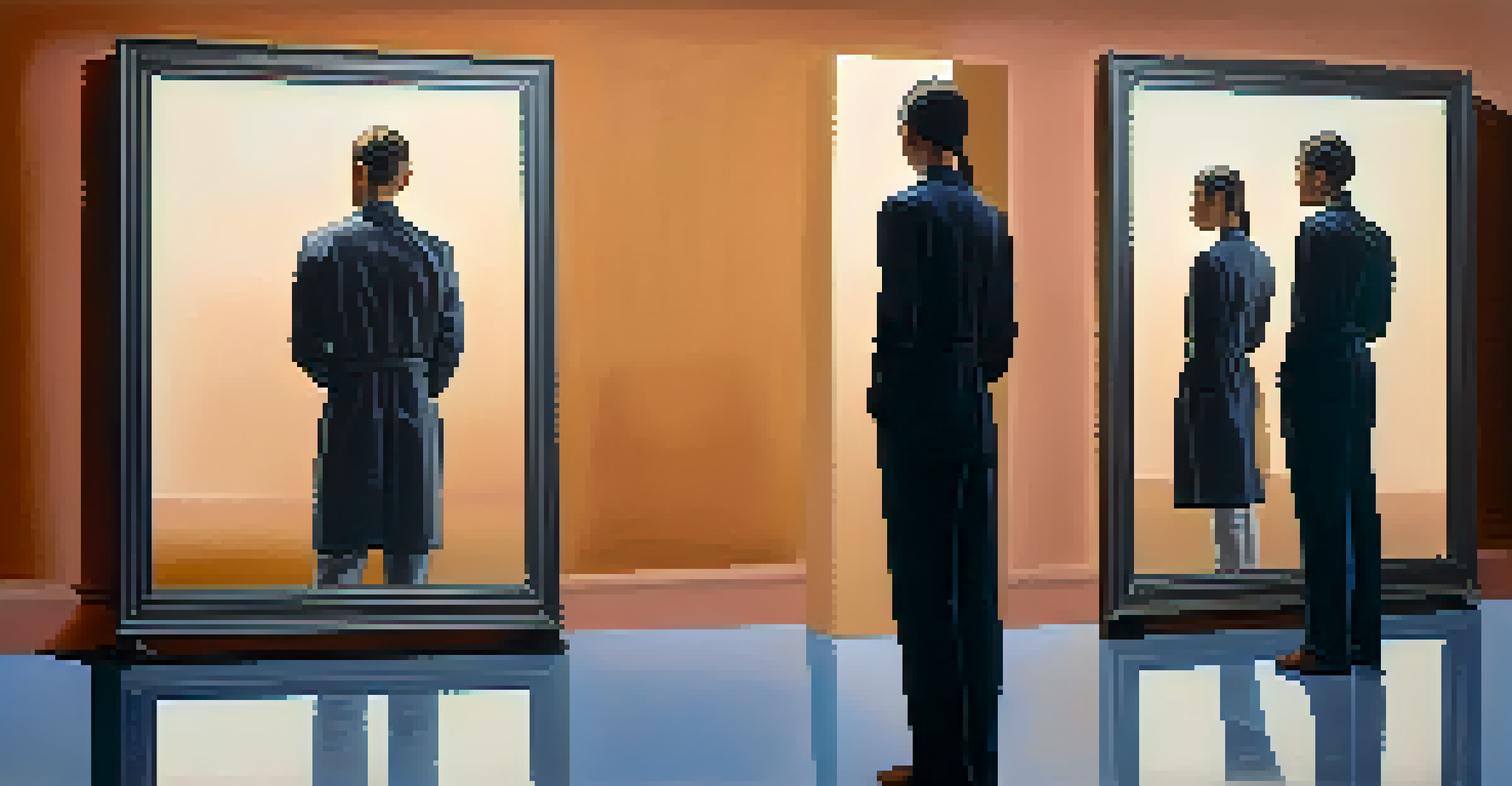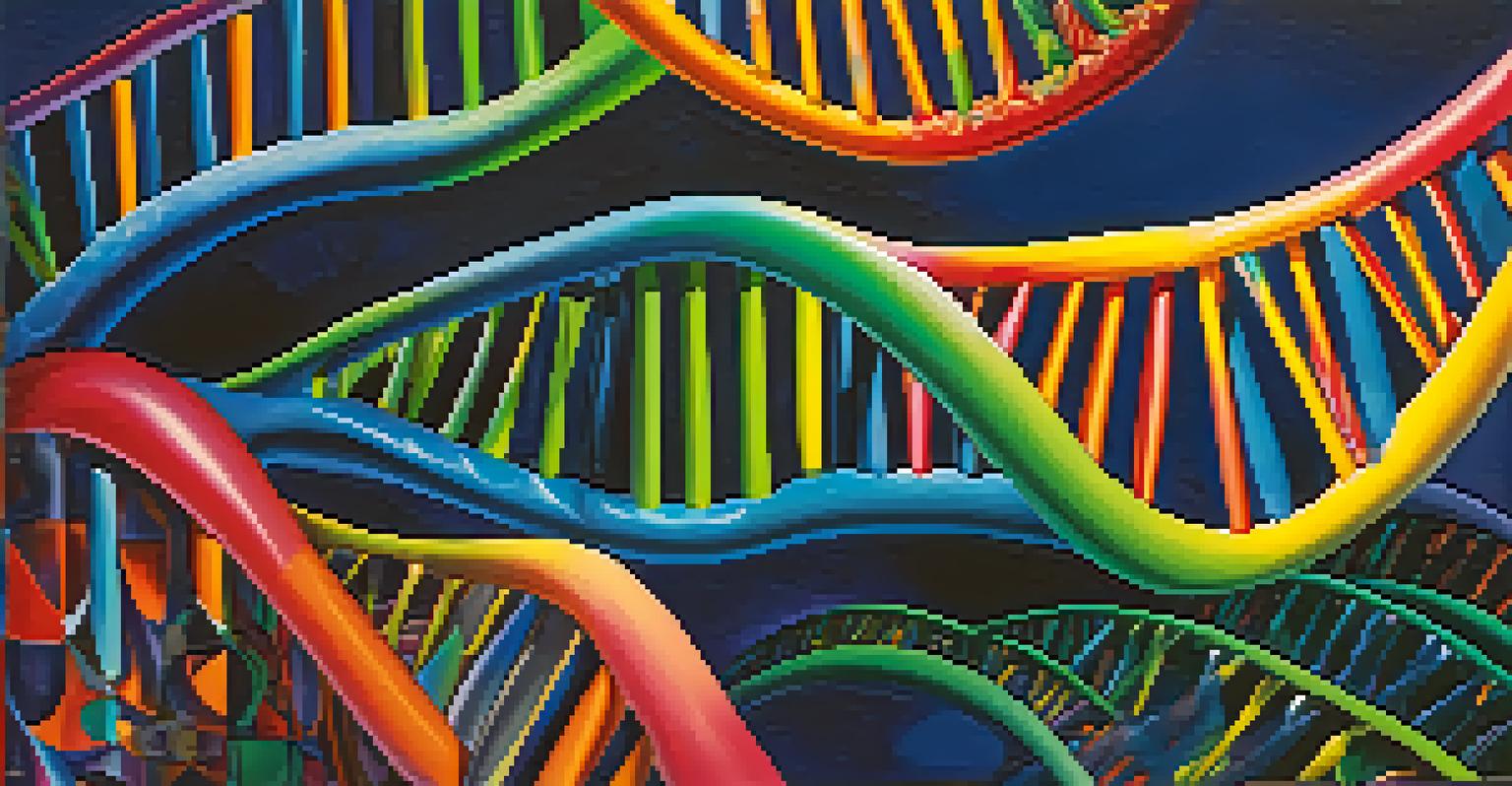The Science of Genetic Cloning in Hollywood's Storytelling

The Basics of Genetic Cloning and Its Appeal
Genetic cloning, the process of creating a genetically identical copy of an organism, is not just a scientific marvel; it's a captivating concept in storytelling. It invites audiences to ponder ethical dilemmas and the nature of identity. Films like 'The Island' and 'Never Let Me Go' illustrate how cloning can blur the lines between humanity and artificial life, adding depth to their narratives.
Cloning is not just a scientific process; it's a philosophical dilemma that challenges our understanding of identity and existence.
This scientific process raises questions about what it means to be human. For instance, if a clone possesses the same DNA as its original, does it share the same memories and emotions? Such inquiries resonate with viewers, making cloning a rich subject for filmmakers who want to explore existential themes.
Hollywood often uses cloning as a storytelling device to challenge characters and their relationships. The tension between clones and their originals often leads to gripping conflicts, inviting audiences to empathize with both sides and reflect on their own values and beliefs.
Cloning in Film: A Historical Perspective
The portrayal of cloning in films has evolved significantly since the early days of cinema. One of the first notable examples is 'The Boys from Brazil' (1978), where a scientist clones Adolf Hitler in a chilling exploration of ethics and morality. This early depiction set the stage for future films to tackle the implications of cloning, both positive and negative.

As technology advanced, so did the complexity of these narratives. Movies like 'Jurassic Park' (1993) took a more adventurous angle, showcasing the wonders and horrors of genetic cloning. Here, the excitement of reviving extinct species was tempered by the catastrophic consequences of playing God.
Cloning Raises Ethical Questions
Films like 'Gattaca' challenge viewers to confront uncomfortable truths about genetic engineering and individual value.
Over the years, cloning has become a versatile plot device, used to explore themes of identity, family, and technological advancement. As societal views on genetics and bioethics have shifted, filmmakers have adapted their stories to reflect these changes, ensuring that the subject remains relevant and engaging.
Ethical Dilemmas Surrounding Cloning in Film
Hollywood doesn't shy away from the ethical quandaries that cloning presents. Films like 'Gattaca' (1997) delve into the consequences of genetic engineering and societal discrimination based on DNA. Such narratives force viewers to confront uncomfortable truths about how we value human life and individuality.
The future of humanity will be determined by how we respond to the ethical questions posed by advances in genetics.
The ethical ramifications extend beyond the screen, sparking real-world discussions about cloning and genetic modification. As audiences engage with these themes, they’re prompted to consider where society should draw the line. This dialogue is crucial, as it informs public opinion and policy regarding genetic science.
Moreover, these ethical dilemmas often serve as a reflection of contemporary concerns. As technology advances, the questions raised in these films become increasingly pertinent, making them a vital part of the cultural conversation surrounding cloning and genetics.
The Psychological Effects of Cloning on Characters
Cloning not only poses ethical questions but also psychological ones. Characters faced with their clones often experience identity crises, grappling with the implications of sharing genetic material with another being. This internal struggle adds layers to character development, making their journeys resonate deeply with audiences.
In films like 'Multiplicity' (1996), the protagonist’s experience of cloning leads to humorous yet poignant explorations of self-identity. The clones, each representing different facets of his personality, highlight the complexity of the human experience, inviting viewers to reflect on their own identities.
Cloning Explores Identity Themes
Characters grappling with their clones often face identity crises, highlighting the complexity of self-perception.
These psychological effects also manifest in the relationships between clones and their originals. The emotional conflict that arises can evoke empathy from the audience, as they witness characters navigate their feelings of jealousy, fear, and connection. Such narratives emphasize that despite genetic similarities, individuality is a fundamental aspect of humanity.
Cloning as a Metaphor for Societal Issues
Hollywood often uses cloning as a metaphor to address societal issues, from class division to the consequences of consumerism. For instance, in 'The Matrix' (1999), the concept of cloning parallels the idea of humans being controlled by a system, prompting discussions about free will and autonomy. This metaphorical use allows filmmakers to tackle complex themes in a compelling way.
Similarly, 'Blade Runner' (1982) uses replicants, bioengineered beings, to explore themes of discrimination and what it means to be truly alive. By framing cloning within the context of social justice, these films encourage viewers to reflect on their own societal structures and the treatment of marginalized groups.
Through these metaphors, filmmakers create a bridge between science fiction and real-world issues, making the stories not only entertaining but also thought-provoking. This ability to resonate with audiences on multiple levels is a hallmark of effective storytelling.
The Future of Cloning in Hollywood Narratives
As technology continues to advance, the future of cloning in Hollywood storytelling looks promising. Filmmakers are likely to explore new dimensions of cloning, such as advancements in genetic editing and their implications for society. This evolution will keep the topic relevant and engaging for audiences, ensuring that the conversation continues.
Moreover, with increasing public interest in genetics, we may see more nuanced portrayals of cloning that consider both its potential benefits and its ethical challenges. This balanced approach will enrich narratives, allowing for deeper character exploration and more intricate plots.
Cloning as Social Commentary
Movies use cloning as a metaphor to address societal issues, prompting discussions about free will and discrimination.
As Hollywood embraces these complexities, audiences will be invited to engage with the material in meaningful ways. The stories that emerge will not only entertain but also foster discussions about the future of humanity and the role of science in shaping our lives.
Conclusion: Cloning's Enduring Influence on Storytelling
In conclusion, the science of genetic cloning has left an indelible mark on Hollywood storytelling. By intertwining complex ethical dilemmas with engaging narratives, filmmakers have created a rich tapestry that resonates with audiences. As we navigate our own technological advancements, these stories challenge us to reflect on our values and beliefs.
The enduring appeal of cloning in film lies in its ability to provoke thought and evoke emotion. Whether it’s through thrilling action, poignant drama, or comedic twists, the exploration of cloning continues to captivate viewers and fuel discussions about identity and humanity.

As we look to the future, it’s clear that the themes surrounding cloning will remain a vital part of cinematic storytelling. Whether as a source of conflict or a mirror reflecting societal issues, cloning will undoubtedly continue to inspire filmmakers and audiences alike.